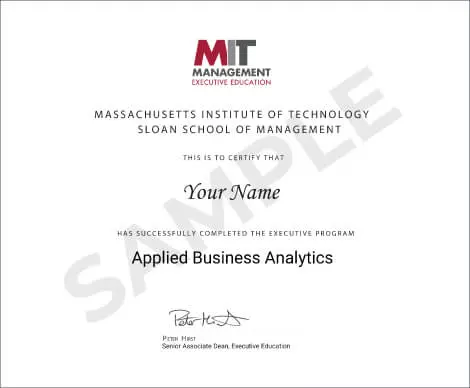Applied Business Analytics
Garner In-Demand Skills
In this six-week program, you will be able to:
Apply analytics to a wide range of business applications.
Select and apply the appropriate algorithm for a given business scenario.
Lead teams and design deliverables using analytics problem-solving.
Establish workflows, identify interdependencies, and utilize human judgement while managing the analytics process.
Who Should Attend
This online program is ideal for managers and leaders who want to turn data into a competitive advantage by advancing their analytics skills. Participants will learn how to decide which is the best tool for their challenge, and how to apply different models. Participants come from a broad range of industries, job functions, and management levels. Past participants of this program include:
Senior executives who strive to leverage data for competitive advantage and build out analytics capabilities in their organizations.
Functional managers and business heads who want to advance their analytics skills and manage data analyst teams more effectively by asking better questions.
Data and Business Analysts who want to deepen their understanding of how to apply analytics tools to common business challenges, such as predicting customer preferences and trends.
Consultants who need to dig deeper into their client's data in order to make better recommendations and speak the same language as data analysts.
Your Learning Experience
Apply descriptive, predictive, and prescriptive tools to real-world case studies and examples.
Download a template for your team's business analytics project plan.
Learn from world-renowned MIT faculty.
Discuss learnings and industry trends with a cohort of peers at the top of their fields.
Bit-Sized Learning
Active support from program Learning Facilitators.
Weekly Q&A through live office hours with Learning Facilitators, and experts in this subject matter.
Program Modules
Learn from the Best at MIT Sloan

Boeing Leaders for Global Operations Professor of Management, Professor of Operations Research, Associate Dean for the Master of Business Analytics
A faculty member since 1988, his research interests include optimization, stochastic systems, machine learning, and their application. In recent years, he has worked in robust...
Hear from our past learners



Earn a Certificate from MIT Sloan
Receive a verified digital certificate of completion from MIT Sloan School of Management. This program also counts toward an MIT Sloan Executive Certificate.
After successful completion of the program, your verified digital certificate will be emailed to you, at no additional cost, in the name you used when registering for the program. All certificate images are for illustrative purposes only and may be subject to change at the discretion of MIT Sloan.
FAQs
Didn't find what you were looking for? Write to us at learner.success@emeritus.org or Schedule a call with one of our Program Advisors or call us at +1 401 264 8575 (US) / +44 150 730 4811 (UK) / +65 3138 5193 (SG)
Early Registrations Are Encouraged. Seats Fill Up Quickly!
Flexible payment options available.
Starts On






